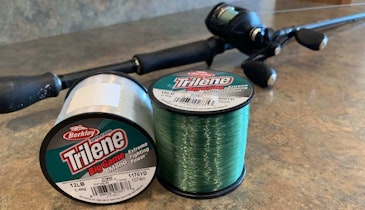Think you know about large-scale aquatic plant management better than the Florida Fish & Wildlife Conservation Commission? Now's your chance to shine.
Anglers, non-anglers and other concerned citizens often think they could take care of a problem better than "the government." In the Sunshine State, one of many issues the fish and wildlife agency wrangles with all the time involves vegetation in lakes.
Anglers have a love-hate relationship with vegetation. Most love it because the hydrilla, milfoil, reeds, cattails and other things provide habitat for fish. Some dislike it because the vegetation can get so thick that it curtails or prevents fishing and boat movement.
Recreational boaters and homeowners usually dislike, and sometimes hate (depending on the amount), vegetation in lakes. Boating, skiing, swimming and other activities including just chilling on the dock watching sunsets can be affected by vegetation.
It's a never-ending situation for the wildlife agency. So it's asking for help.
Here's the press release and invitation to contribute ideas for non-herbicide aquatic vegetation management.
The Florida Fish and Wildlife Conservation Commission is seeking new ideas for managing aquatic plants without the use of herbicides.
At the FWC meeting on Dec. 11, Commissioner Rodney Barreto led a discussion resulting in the agency setting aside $1 million of current funding to test or implement innovative ideas to manage invasive aquatic plants.
The agency posted a Request for Information on Dec. 3, 2019, that solicits ideas from those in the aquatic plant management industry, scientific experts and the general public. The FWC has requested another $4 million for non-herbicide plant management from the legislature.
“Come one, come all,” said Commissioner Barreto. “Tell us how we can do better at managing aquatic plants.”
The FWC has a statutory responsibility to manage invasive plants in Florida’s public waters. If unmanaged, invasive plants can outcompete and kill native species and create threats to human health and safety by blocking navigation and interfering with flood control. Successful plant management benefits fish and wildlife populations by maintaining diverse plant communities that provide essential habitat and food for both fish and wildlife.
“We have an obligation to manage invasive plants and that currently requires a multi-faceted approach using a variety of tools,” said FWC Executive Director Eric Sutton. “While we all would like to see a future where aquatic plants can be managed without herbicides, we will need innovation and discovery of new techniques to be able to achieve that goal.”
Previous Efforts
Based on public feedback the FWC has received in the last year, the agency has implemented a variety of changes to improve the Aquatic Plant Management Program. These include:
- Expanding the creation of habitat management plans for individual lakes.
- Forming a Technical Assistance Group consisting of staff, partners and stakeholders.
- Improving timing of herbicide-based invasive aquatic plant management efforts.
- Increasing the use of mechanical harvesting to manage aquatic plants.
- Exploring new methods and technologies to oversee invasive plant herbicide application contractors.
- Developing pilot projects to explore better integrated plant management tools.
- Improving agency communication regarding plant management tools and activities.
The deadline for submitting ideas to the FWC on how to manage waterbodies without herbicides is Jan. 7, 2020. The FWC hopes that the information submitted will form the basis of new pilot projects and future bid proposals.
Information on the enhancements to the FWC’s Aquatic Plant Management Program and a link to the official Request for Information that includes detailed information on how to submit ideas is available at MyFWC.com/AquaticPlants. Click on the “Learn More” at the top of the page.
For information on plant management on a specific lake as well as fishing forecasts, virtual tours, plant control operation schedules and annual workplans, boat ramp information, and more, visit the “What’s Happening on My Lake” website at MyFWC.com/Lake.






